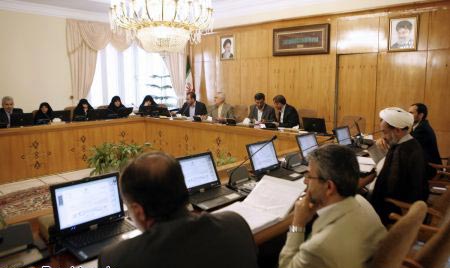The word approbatory supervision of the Guardian Council entered Iran’s political talk during the fourth majlis elections. Some critics, who are largely from the left wing political affiliation, not only objected to the nomination, they also called the supervision of the Guardian Council passive and say that the approbatory supervision dates from the time of late Imam Khomeini’s death.
The current opposes the approbatory supervision of the Guardian Council while previously, during the life time of Imam Khomeini, the council in practice followed the approbatory supervision. One example of such approbatory supervision is found in the second majlis term elections.
For the formation of the Guardian Council, the Iranian constitution calls for the council to be composed of six Islamic faqihs (expert in Islamic Law), "conscious of the present needs and the issues of the day" to be selected by the Supreme Leader of Iran, and six jurists, "specializing in different areas of law, to be elected by the Majlis (the Iranian Parliament) from among the Muslim jurists nominated by the Head of the Judicial Power," (who, in turn, is also appointed by the supreme leader).

That round of elections was held at a time when, a few years after the revolution, the country had experienced a period full of ups and downs and many of the big followers and friends of Imam Khomeini such as ayatollah Motahari and ayatollah Beheshti had died. Also, Banisadr as Iran’s first president had fled and Mohammad Ali Rajaee, that followed Banisadr, had been killed along with prime minister Mohammad Javad Bahonar.
Besides that, along the years, the country had entered an imposed war and spent all of its material and spiritual assets for defending its independence and territorial integrity. Also, opposing groups and modes of thought, such as the people’s mujahedin had conducted joint efforts with foreigners and outside powers to make the government week by assassinating statesmen and officials.
Not only that, but the Islamic Revolution’s standoff with the West and the US in particular had entailed severe economic, political, and military sanctions. What is interesting is that under those circumstances, there was no disruption in the elections process and the elections were held exquisitely and timely.
In that round of elections, many opposing groups had resorted to armed rivalry and were seeking to terrify people away from the Islamic Republic. There were also opposing groups which not outwardly doing stuff like that, but were either resorting to sanctions or refraining from the elections by claiming that there was no freedom.
In that round of elections, 1586 people stated ready to attend the elections as candidates. 1275 were qualified by executive boards and the Guardian Council. 115 people later resigned from running.
The disqualification of one of the candidates led to uprising. Following that, hojjatoleslam Nateq Nouri, then minister of interior, ordered: Arrest the man who has opposed to the verdict of the Guardian Council and has set up an uprising.
Then interior minister hojjatoleslam Nateq Nouri in his autobiographical book which has been published by the Islamic Republic Documents Center writes: In the elections of the second Islamic consultative assembly, Mr. Seyyed Mohammad Ali Zaboli, from Sistan was disqualified by the Guardian Council. He was a cleric and had a very clerical face. Some people from Sistan also rose up and set on fire the office of then Friday prayer leader Mr. Ebadi. Then they walked toward the Governor General office to take it. Mr. Seyyed Ahmad Nasri who was the governor general then, called and said, "Haj agha (sir), they are coming toward our governor general office. What should we do?” I said, "Do not give way. Take action.” It was the noon of a Friday when I told Mr. Akhondi who had went to Urmia city to launch a special provision council to go directly from there to Zahedan. It had happened so that that Friday Mr. Shamkhani also was there. So the two flew to Zahedan and took control of things in the afternoon of that very day. Mr. Fallahian also joined them the following day. Then we sent Fallahian, Akhondi, and Shamkhani there with forces and facilities and authority. The following day they confinced Mr. Zaboli to go to the governor general’s office. Mr. Akhondi called and said "Mr. Zaboli is here. What should we do?” I said, "Respect him, but remove his turban, blind fold him, and throw him to jail.” Mr. Akhondi said doing so will come with great cost. I said, "Do as I ordered.”
The first round of the second Majlis was held on the 26th day of the Farvardin of the Iranian year 1363, which coincided with the birth anniversary of Imam Ali ibn Abi Talib. Then about 15 million, 995 thousand and 21 votes were cast into the boxes. And 121 candidates found their way into the majlis. 130 of the candidates found their way to the majlis in the second round of the elections which was held about a month later. The rest of the candidates were elected in the mid-term elections.